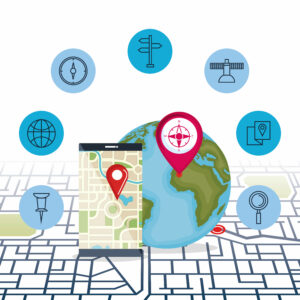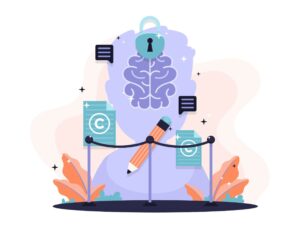
E-commerce in the Era of AI, SEO and GEO – Technology and Responsibility
- On 25/11/2025
- AI, AI ethics, AI Optimization, AI personalization, AR, AR shopping, click & collect, consumer behavior, data protection, dynamic offers, e-commerce growth, generative SEO, GEO targeting, green logistics, live commerce, logistics optimization, marketplace model, mobile shopping, online retail, smart lockers, social commerce, subscription commerce, sustainability, UX, VR shopping
E-commerce is no longer just an additional sales channel — it has become a key driver of the global economy. According to Statista, the global e-commerce market surpassed $6 trillion in 2024, with forecasts for 2025 pointing to continued double-digit growth. In Bulgaria, e-commerce is also expanding steadily, with more consumers choosing online shopping as their primary purchasing method.
At the same time, technology is advancing at an unprecedented pace: artificial intelligence (AI) is transforming how brands communicate with customers; SEO and generative tools optimise content and online visibility; and GEO technologies enable highly personalised offers based on a user’s location. The question is no longer whether businesses should use these technologies, but how to use them responsibly and ethically.
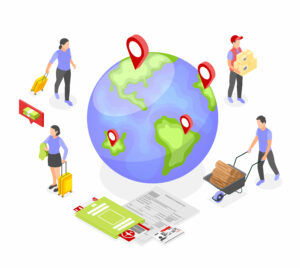 Global Trends
Global Trends
AI plays a central role in personalisation, service automation, and demand forecasting. According to NextBasket, voice commerce and AI-powered UX solutions are becoming increasingly popular, while sustainable and eco-friendly practices are emerging as key factors influencing consumer decisions.
Mobile devices dominate the landscape: over 55% of global online purchases are completed via smartphone, making mobile-optimised websites and apps an essential standard for any successful e-commerce platform.
 The Bulgarian Market
The Bulgarian Market
In Bulgaria, e-commerce is growing at a consistent double-digit rate (around 20% annually). Mobile orders account for more than 50%, and delivery methods span traditional courier services, click-and-collect models, smart lockers located at key sites, and express deliveries.
According to research by the Bulgarian E-commerce Association (BEA), this growth is expected to continue as more small and medium-sized businesses adopt AI-driven tools and personalised marketing. Challenges remain, however: some consumers still prefer to see products in person, and trust in online payments is not yet universal.
The New Technologies: AI, SEO & GEO
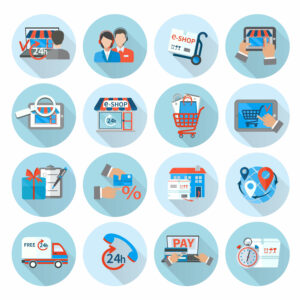 AI in E-commerce
AI in E-commerce
AI is reshaping the way consumers shop and interact with brands, becoming the foundation of more responsible and personalised digital experiences. Machine learning and recommendation algorithms allow retailers to deliver highly relevant product suggestions, optimise website content, and forecast demand with greater accuracy. Intelligent chatbots and 24/7 support systems streamline customer service, while behavioural analytics enable more precise marketing strategies. On the experiential side, AR and VR introduce realism and interactivity — from virtual try-ons to digital showrooms — turning AI into a core driver of modern online shopping.
SEO and Generative Technologies
In the age of intelligent systems, SEO is evolving toward deeper integration with AI and generative technologies. Emerging approaches such as generative SEO and optimisation for AI assistants not only boost search visibility but also make content more relevant, personalised, and accessible. This shift is essential for meeting the rising demand for high-quality information in the context of voice search and automated systems.
GEO and Localisation
GEO technologies complete the trio of modern e-commerce pillars by enabling precise targeting based on location, language, and behavioural patterns. This leads to personalised offers, optimised delivery routes, and marketing campaigns tailored to specific cultural and regional nuances. Localisation is becoming a critical factor for brands seeking to stay relevant — both globally and in Bulgaria.
 New Business Models
New Business Models
New e-commerce models are rapidly reshaping how consumers discover and purchase products. Social commerce transforms platforms like Instagram and TikTok into direct sales channels, where users can move from inspiration to purchase in seconds. Live commerce adds real-time interaction through livestream sales, replicating a dynamic “TV shopping” experience with demonstrations, Q&As, and instant purchasing. Subscription commerce introduces predictability and convenience through recurring deliveries of food, cosmetics, and household products. Meanwhile, marketplace giants like Amazon and Emag.bg continue to dominate by offering extensive infrastructure, massive audiences, and logistical support. Together, these models form a multilayered ecosystem that helps brands reach customers more strategically than ever.
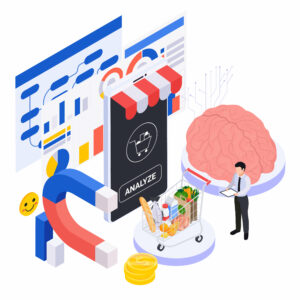 The Psychology of Online Shopping
The Psychology of Online Shopping
E-commerce heavily relies on psychological triggers to drive engagement and conversion. Scarcity indicators and countdown timers create urgency, while social proof — ratings, reviews, and bestseller tags — builds trust. FOMO and reciprocity cues (such as free samples or gifts) encourage faster decision-making. Anchoring effects make offers more appealing by presenting reference prices first. AR/VR tools, dynamic recommendations, and personalised suggestions enhance emotional engagement, while small UX improvements like clear CTAs, streamlined forms, and intuitive navigation significantly increase conversion rates.
Ethics, Regulations & Sustainability
In 2025, ethical AI has become a strategic priority for the retail sector. The European AI Act requires transparency, documentation of training data, and strict oversight of high-risk systems. Businesses are implementing regular bias audits and the “human-in-the-loop” principle. For example, AI shopping assistants may recommend products, but an ethical approach requires clearly informing users that they are interacting with a machine and that decisions are human-supervised. While recommendation algorithms and personalised offers can boost sales, they may also reinforce bias when based on skewed data. Brands that pair transparent algorithms with ethical practices gain trust and competitive advantage, as consumers increasingly value fairness and data protection.
The Future of E-commerce
The coming years will be defined by the balance between innovation and responsibility. AI will anticipate shopper needs and personalise experiences, while AR/VR will make online shopping more interactive and emotionally engaging. Regulations like the EU AI Act will enforce greater transparency and accountability. Companies that integrate ethical AI, strong data protection, and sustainable practices will position themselves as leaders.
In Bulgaria, localisation and GEO optimisation will sharpen targeting, and small businesses will gain new opportunities to compete within the global digital ecosystem. The future is intelligent, personalised, and responsible — and the brands that combine innovation with ethics will lead the market.


